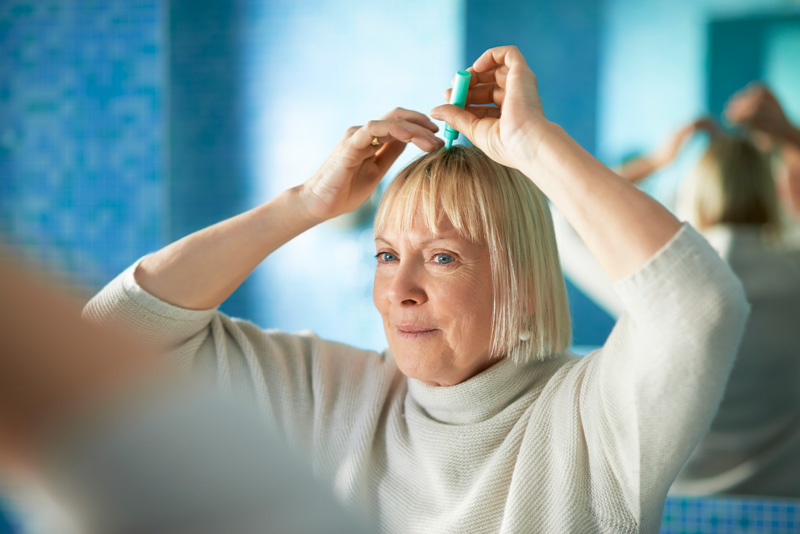
Navigation Panel
During menopause, the body adjusts to changing hormone levels and goes through a number of physical changes.
Hair loss in menopause is one of the common symptoms seen during this phase just like hot flushes, mood swings and sleep disturbances.
Most of the women notice changes in their hair pattern during menopause or later especially when the volume, growth and quality of the hair worsens.
Most women experience a typical hair loss pattern called Female pattern hair loss (FPHL) with thinning of hair at the crown of the head, sides, top of the head and general thinning all over the head. Large clumps may fall while showering and brushing the hair due to mechanical stress. Most women experience overall hair thinning rather than excessive or noticeable major hair loss like bald spots in men unless there is an underlying medical condition or due to medical treatment such as chemotherapy.
For most of the women, our hair is often a part of one’s personality and expression, something they like to decide how to wear it or style it. Because of this, losing a lot of hair may make us feel less in control.
Why does it happen?
Although it is believed to be estrogen and progesterone which may have a protective role and help the growth of hair, menopause is not the only cause to blame for FPHL. During menopause, hormonal changes are most likely the cause of hair loss, however there may be other causes of hair loss. Such as,
1. Ageing affects the whole body and sometimes cosmetic measures do not help to age.
2. Genetics play a role in hair loss too and hair loss varies across ethnic groups.
3. Acute stress such as illness.
4. Poor diet and lack of nutrition.
5. Emotional stress.
6. Iron deficiency, anaemia and low ferritin.
7. Thyroid dysfunction.
8. Skin disorder affecting the scalp.
9. Raised testosterone levels.
It can happen at any age but commonly noticed following the menopause.
What can I do?
Step 1 : Eat Well
- A healthy, varied diet is a contribution to a healthy body, skin and hair.
- You should try to include an adequate amount of fruits, vegetables and whole grains in your daily routine.
- Choose healthy fat such as olive oil instead of saturated fats.
- Try to include food with essential fatty acids such as tuna, salmon, flaxseeds, walnuts and almonds. Some researchers have shown the benefits of B group vitamins and folic acid to restore hair growth. Also, antioxidants help hair follicles to fight damage from the environment.
Step 2 : Hydrate yourself
Keep up your fluid levels adequate and try to maintain at least 8 glasses of water per day unless otherwise restricted due to any coexisting medical illness.
Step 3 : Reduce Stress
Hormonal imbalance can cause mood swings, anxiety and depression often leading to increased level of stress.
Fighting physical and emotional symptoms of menopause itself can be stressful. Following mindfulness, breathing exercises like pranayama and doing yoga can help relax.
Step 4 : Get some exercise
Exercising regularly is a key to a healthy life which can also help reduce stress.
It makes you feel healthier, stronger and happier. It helps with mood swings, healthy weight and good sleep all of which are important for maintaining hormonal balance and eventually help with healthy hair.
Hair oil massage with suitable essential oils may help. Massaging scalp will improve blood circulation and improve growth of hair. Topical hair growth solutions approved by doctors may be tried. These may take several months to take effect and usually are required on an ongoing basis.
Try to use less extreme heat causing tools such as straighteners and hair dryers. Excessive heat can damage hair follicles and dry them up which makes them more vulnerable to damage. Instead, use a thickening shampoo and conditioner which may improve hair appearance. Seek professional help if required. Avoid tight ponytails and braids which stretch your hair a bit too extra and pull them away from the scalp which loosens the bond between hair and scalp in long run. Keep bleaches and chemical away if possible as they can cause irreversible damage to hair follicles.
Wear a swim cap to protect your hair from chlorine while swimming. Protect bald areas of your scalp from direct sun to prevent further damage to the skin. A hat will help to prevent dryness and breakage on sunny and windy days.
Some medications have side effects that could cause hair loss. Talk to your doctor if you’re concerned about any medicines that you think may be causing significant hair loss.
Menopause-related hair loss will slow down with time. It can be challenging and upsetting. Taking care of general health and nutrition may help it to slow down and improve the quality of your hair.
Consult your doctor if you have any unusual symptoms such as losing hair rapidly at an early age or losing hair in an unusual pattern, have pain or itching with hair loss and scalp becomes red or scaly. You should contact your doctor for any other additional symptoms which concern you to avoid any underlying condition.






